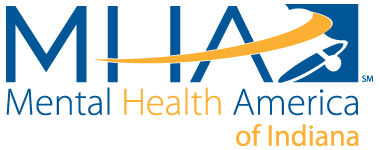Agenda
TIME
TITLE
session/speaker/abstract
MORNING SESSIONS
9:00 AM – 9:15 AM
Welcome Remarks
Liberty Hall
Steve McCaffrey, President & CEO
Mental Health America of Indiana
Leslie Hulvershorn, MD
IU Department of Psychiatry
9:15 AM – 10:15 AM
Morning Keynote
Liberty Hall
Ringing the Alarm on Black Youth Suicide
Tamika C.B. Zapolski, PhD
Associate Professor
Indiana University School of Medicine
Track: Suicide Prevention
10:15 AM – 10:30 AM
BREAK & EXHIBIT HALL
10:30 AM – 11:30 AM
Morning Session
Liberty Hall
Panel Discussion on Economic, Legal, and Health Benefits and Risk of Cannabis Legalization
Matthew Aalsma, PhD.
Professor of Psychology and Pediatrics and Division Chief of Child Health Services Research
IU School of Medicine
Olawale Ojo, MD
Track: Research
Morning Session
Veterans Hall 1
Overview of Indiana’s Pediatric Behavioral Health Strategic Plan
Leslie Hulvershorn, MD
Chair, Department of Psychiatry
Indiana University School of Medicine/Indiana University Health
Tyler Leishman, MD
Track: Research
Morning Session
Veterans Hall 2
Science of Burn-out and How To Improve Workplace Wellness
Angela Rollins, PhD
Associate Director and Research Health Scientist
VA HSR&D Center for Health Information and Communication
Track: Research
Morning Session
Veterans Hall 3
Nothing About Us Without Us: Inclusive Strategies to Advocate for “Big Picture” Changes
Heather Rodriguez
Vice President of Recovery Advocacy and Programs
Director, Indiana Recovery Network
Mental Health America of Indiana
Charmin Gabbard
Executive Director and Co-founder
Connection Café
Aisha Diss
Founder & Executive Director
project.ME
Track: Skills Development (Recovery Support)
Morning Session
Veterans Hall 4
Disaster Behavioral Health Fundamentals: Understanding the Field and Opportunities for Involvement
Jennifer Stansberry Miller
Vice President, Crisis Services
Mental Health America of Indiana
Kimble Richardson, LMHC, LCSW, LMFT, LCAC
Manager of Business Development and Coordinator of Indiana’s District 5 REST Team
Community Fairbanks Behavioral Health
Track: Skills Development
Morning Session
Veterans Hall 5
Prevention Messaging: Evidence-Based Practices for Public Health
Dane Minnick
Prevention Bureau Chief
Indiana Division of Mental Health and Addiction
Track: Skills Development
Morning Session
Salon 6
Indiana’s Governor’s Challenge To Prevent Suicide Among Service Members, Veterans and their Families (SMVF)
Bryan Schmidt
Health & Wellness Coordinator
Indiana Department of Veterans Affairs
Michelle Bulington
Track: Suicide Prevention
Morning Session
Salon 7
Indiana CHAMP Program Progress Report and Case Studies
Camila Arnaudo, MD
IU School of Medicine, Department of Psychiatry
Track: Research
Morning Session
Salon 8
Stigma of Mental Illness and Addiction: From Science to Action
Bernice A. Pescosolido
Distinguished Professor of Sociology / Director, Irsay Institute
Indiana University
Track: Research
Morning Session
Freedom Hall B
Mapping the Criminal Justice System Through SIM
Steve R. Kelly
Director of Court Services
Dearborn County Court Services
Aaron Spaulding
IRACS Program Manager
Choices Coordinated Care Solutions & 1Voice
Track: Skills Development
Morning Session
Private Dining Room
Alcohol Use Disorder ECHO Training Program
Melissa A. Cyders, PhD
Full Professor and Director of Clinical Training
Indiana University Purdue University Indianapolis
Track: Research
11:30 AM – 11:45 AM
BREAK & EXHIBIT HALL
11:45 AM – 12:15 PM
Liberty Hall
Heroes Testimonial
12:15 PM – 1:15 PM
Liberty Hall
Heroes Luncheon
1:15 PM – 1:30 PM
BREAK & EXHIBIT HALL
1:30 PM – 2:30 PM
Afternoon Keynote
Liberty Hall
Working when the pressure’s on: Preventing burnout and protecting wellbeing
Jolie Wills, M.Sc. Cognitive Psychology
CEO Americas
Hummingly
Track: Skills Development
2:30 PM – 2:45 PM
BREAK & EXHIBIT HALL
2:45 PM – 3:45 PM
Afternoon Session
Liberty Hall
Let’s Talk Mental Health – a panel of teen advocates embracing empathy and creating change
Karin Gilbert, MEd, CYC-P
Indiana Regional Program Manager
Bring Change to Mind
Annie Cole
Indiana Regional Program Associate
Bring Change to Mind
Track: Skills Development
Afternoon Session
Veterans Hall 1
Examining Impacts of Substance Use Before Birth and Beyond
Jackie Franks, Executive Director
Indiana Alliance on Prenatal Substance Exposure
Anne Gabbert, Education and Resource Manager
INfancy Onward
Track: Skills Development
Afternoon Session
Veterans Hall 2
Psychological Safety: The Foundation of Emotional Wellness Within the Workplace
Karisa Vandeventer, MA, LCAC, LMHC
Deputy Director of Education and Credentialing
Mental Health America of Indiana
Track: Skills Development
Afternoon Session
Veterans Hall 3
Recovery Support Professionalism through Active and Reflective Listening/ Foundational Upskilling
Gina Fears
MHAI Peer Innovation Manager
MHAI ICAADA, SWD Training Institute, IAPRSS
Hana Tingle
Outcomes Coordinator
Mental Health America of Indiana
Track: Skills Development (Recovery support)
Afternoon Session
Veterans Hall 4
Expanding Services for Indiana Youth and Families Exposed to Trauma
Zachary Adams, PhD, HSPP
Associate Professor of Psychiatry
Indiana University School of Medicine, Riley Children’s Health
Track: Research
Afternoon Session
Veterans Hall 5
Reflecting on the Youth Risk Behavior Survey: Youth Perspectives
Kate Schedel, MPH
Program Director for Maternal, Child, and Adolescent Health
Indiana Department of Health
Track: Skills Development
Afternoon Session
Salon 6
CANCELLED: Suicide Fatality Reviews and How to Take Community Action
Caitlyn Short, MPH
Suicide and Overdose Fatality Review Program Director
Indiana Department of Health
Track: Suicide Prevention
Afternoon Session
Salon 7
L.O.S.S. Teams: An Instillation of Hope to Loss Survivors
Denise Meine-Graham
C.T. (Certified Thanatologist) and TRCC (Trauma Responsive Care Certified)
Postvention Consulting, LLC
Track: Suicide Prevention
Afternoon Session
Salon 8
Expanding Indiana’s Capacity to Serve Youth with Serious Conduct Problems: Statewide Implementation of Multisystemic Therapy
Gabriela M. Rodriguez, PhD, HSPP
Assistant Professor of Clinical Psychiatry
Indiana University School of Medicine
Amanda Vivian Broderick, PhD, HSPP
Assistant Professor of Clinical Psychiatry
Indiana University School of Medicine
Track: Research
Afternoon Session
Freedom B
The Benefits and Risks of ADHD Medication: Evidence from Real-World Practice
Brian D’Onofrio
Sharon Stephens Brehm Endowed Professor
Indiana University
Track: Suicide Prevention
Afternoon Session
Private Dining Room
Not In My Backyard – Recovery Residence Best Practices
Linda Stevens
Program Manager – INARR
Mental Health America of Indiana
Track: Skills Development
